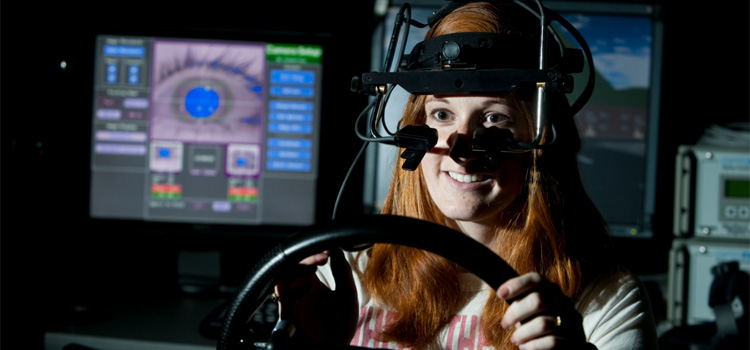Overview
The department offers majors in brain and cognitive sciences, and neuroscience. Students can also minor brain and cognitive science.

MindSpace Virtual Reality Laboratory at the University of Rochester.
Brain and Cognitive Sciences
The brain and cognitive sciences (BCS) major offers undergraduates the opportunity to study the nature and products of mental activity, including:
- Perception
- Action
- Thinking
- Language
- Learning
- Memory
This rigorous but accessible natural science discipline lies at the intersection of cognitive psychology, computer science, and neuroscience, bringing these fields together to understand the activities of the mind and brain.
The department offers both a BA and a BS in brain and cognitive sciences. Both degrees are built around a common curriculum that integrates biological, behavioral, and computational approaches to the study of perception, language, thinking, learning, and development. While most of the requirements are the same, the BS degree requires additional courses outside the BCS department, including biology, math, linguistics, and computer science.
Neuroscience
The department also administers the BS degree in biological sciences with a concentration in neuroscience. Neuroscience (NSC) is one of the tracks associated with the Undergraduate Program in Biology and Medicine, and provides students interested in biology with an opportunity to explore the molecular, cellular, and physiological bases of behavior.
NSC majors gain a background in biology, chemistry, physics, and mathematics, along with a concentration of courses in neuroscience. Neuroscience adopts a multidisciplinary approach to the study of nervous systems, and helps students understand how cells and circuits of this organ system function to generate and regulate behavior.
Choosing a Major
While BCS and NSC overlap somewhat in their focus on the brain and what it does, the NSC major emphasizes biological and chemical investigations of brain function in relation to behavior, whereas the BCS major blends biological, behavioral, and computational approaches to focus more strongly on the cognitive and perceptual abilities mediated by the brain. Whether you choose a to major in neuroscience or brain and cognitive science, you will acquire many important skills, including:
- Logic and methods of scientific inquiry
- Critical thinking and reasoning
- Engaging in real research problems
- Writing succinct and fluent scientific reports
- Basic disciplinary qualification for graduate or professional training in the behavioral and neural sciences
Options for career paths, research opportunities, and graduate programs are quite fluid between BCS and NSC majors. Choosing a BA degree allows for greater flexibility since it requires fewer courses, and generally does not restrict you from graduate school or employment in the field. Medical school and other health professions are open to any major as long as the appropriate prerequisite courses are completed.
Get Involved
Students looking to connect with others in neuroscience, or brain and cognitive sciences, should check out our undergraduate council and undergraduate research page.
Contact
Questions about our undergraduate programs? Contact our undergraduate coordinator.
